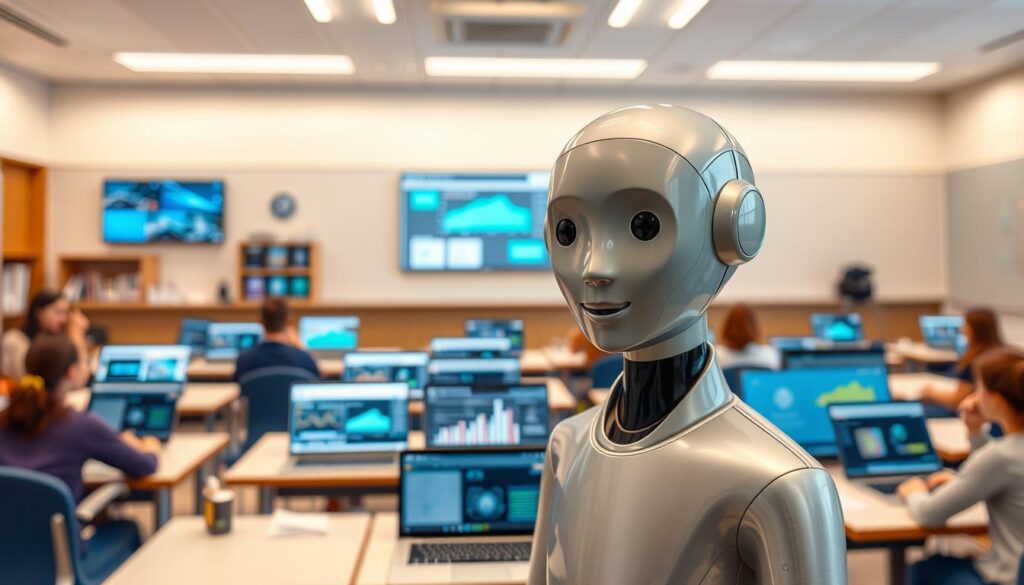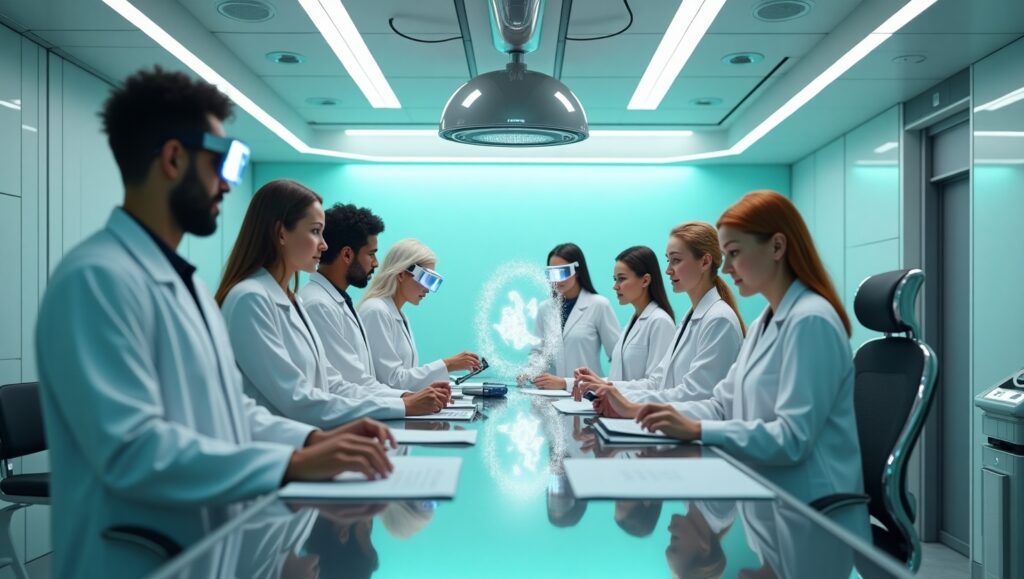The intersection of artificial intelligence (AI) and medical research is nothing short of revolutionary. AI, with its ability to process enormous datasets, detect patterns invisible to the human eye, and predict outcomes with astonishing precision, is reshaping the medical landscape.
What once took scientists decades to analyze can now be unraveled in weeks. From designing life-saving drugs to diagnosing complex diseases with superhuman accuracy, AI is pushing the boundaries of what’s possible in medicine. Let’s explore how AI-powered tools are transforming the world of medical research.
1. The Role of AI in Medical Research: A Paradigm Shift
Medical research is a field of staggering complexity, and AI is proving to be its most powerful ally. The traditional approach—characterized by years of labor-intensive studies, manual data analysis, and trial-and-error methodologies—is being replaced by an AI-driven paradigm that prioritizes speed, precision, and efficiency.

How AI Is Reshaping Medical Research:
✔ Lightning-fast data analysis: AI algorithms can process vast amounts of medical data at unprecedented speeds.
✔ Enhanced pattern recognition: AI can identify correlations in medical conditions, symptoms, and treatment outcomes.
✔ Predictive modeling: AI forecasts disease progression and potential treatment responses.
✔ Cost reduction: Automating research processes slashes costs and accelerates drug development.
AI is no longer a futuristic concept—it’s the driving force behind some of the most exciting breakthroughs in medical science.
2. AI in Drug Discovery: Unlocking New Treatments at Warp Speed
The traditional drug development pipeline is long, expensive, and filled with uncertainty. AI is rewriting this narrative, dramatically accelerating the search for new medications by identifying promising compounds, simulating molecular interactions, and predicting drug efficacy.
Top AI Tools Leading the Drug Discovery Revolution:
🔹 DeepMind’s AlphaFold – Cracks the protein-folding problem, revolutionizing drug design.
🔹 Atomwise – Uses deep learning to predict how molecules interact, expediting drug discovery.
🔹 BenevolentAI – Leverages AI to identify novel drug candidates and repurpose existing medications.
🔹 Insilico Medicine – Applies AI to aging research, developing innovative therapies.
With AI, what once took years of tedious research can now be achieved in a fraction of the time, bringing life-saving treatments to patients faster than ever.
3. AI in Medical Imaging and Diagnostics: Precision Beyond Human Capability
The ability to detect diseases early can mean the difference between life and death. AI-powered medical imaging is changing the game, identifying tumors, abnormalities, and diseases with unparalleled accuracy.

How AI is Transforming Diagnostics:
📌 Radiology: AI-driven algorithms detect cancers, fractures, and lung conditions in X-rays, CT scans, and MRIs.
📌 Pathology: AI-powered microscopes analyze tissue samples for faster and more accurate diagnoses.
📌 Cardiology: AI examines heart rhythms and detects anomalies in ECG scans with near-perfect precision.
Cutting-Edge AI Diagnostic Tools:
🔍 IBM Watson Health – Analyzes medical literature to assist doctors in diagnosing conditions.
🔍 Qure.ai – Automates radiology interpretation, reducing workload for radiologists.
🔍 Viz.ai – Detects strokes in real-time, expediting emergency interventions.
AI isn’t just assisting doctors—it’s revolutionizing the accuracy and efficiency of medical diagnoses.
4. AI and Genomic Research: Decoding the Blueprint of Life
Genomics holds the key to understanding inherited diseases, predicting health risks, and personalizing medicine. AI is supercharging genetic research, making genome sequencing faster, more accurate, and more accessible.
AI in Genomic Research:
🔬 Identifying genetic mutations linked to diseases.
🔬 Predicting an individual’s response to specific treatments.
🔬 Customizing therapies based on genetic profiles.
Powerful AI Tools in Genomics:
🧬 DeepVariant (Google AI): Converts raw DNA sequencing data into highly accurate genetic variations.
🧬 Genoox: Uses AI to make genetic data analysis accessible for clinical applications.
🧬 Fabric Genomics: Detects rare genetic disorders, paving the way for precision medicine.
AI is unlocking the secrets hidden within our DNA, offering new hope for patients with genetic conditions.
5. AI in Clinical Trials: Speeding Up Life-Saving Research
Clinical trials are essential for testing new treatments, but they are often bogged down by inefficiencies, high costs, and slow patient recruitment. AI is optimizing every step of the process.

How AI is Revolutionizing Clinical Trials:
⚡ Predicting treatment responses: AI models forecast how patients will react to drugs, reducing trial failures.
⚡ Identifying eligible participants: AI scans medical records to find suitable candidates in minutes.
⚡ Automating data collection: AI reduces human errors, ensuring more reliable trial results.
Top AI Tools in Clinical Trials:
💡 Antidote.ai: Matches patients with clinical trials based on their medical history.
💡 Deep 6 AI: Analyzes electronic health records to streamline trial recruitment.
💡 Medidata AI: Uses machine learning to enhance trial efficiency.
With AI, groundbreaking treatments can reach patients faster, transforming the future of medicine.
6. AI in Epidemiology and Public Health: Predicting and Preventing Outbreaks
AI is a powerful tool in combating global health threats, from pandemics to chronic diseases. By analyzing vast amounts of data, AI can predict disease outbreaks, track infection patterns, and assist in public health decision-making.
AI Applications in Public Health:
🌍 COVID-19 forecasting models: Predict the spread of infectious diseases.
🤖 AI-driven health chatbots: Provide immediate medical guidance.
📊 Population health analytics: Identify at-risk groups and optimize healthcare resources.
Leading AI Tools in Epidemiology:
🦠 BlueDot: Detected the COVID-19 outbreak before the WHO’s official announcement.
🦠 Metabiota: Predicts pandemic risks using AI-powered modeling.
🦠 HealthMap: Uses AI to track global disease outbreaks in real-time.
AI is playing a pivotal role in safeguarding global health by predicting and mitigating health crises before they escalate.
7. The Ethical Dilemma: AI’s Promises and Pitfalls
While AI in medical research offers extraordinary benefits, it also raises critical ethical questions:
⚠ Data Privacy: How do we protect patient data in an AI-driven world?
⚠ Bias in AI Models: Can AI be truly impartial, or will it reflect existing biases in healthcare?
⚠ Regulation Challenges: How can governments create policies that ensure AI is used responsibly?
The medical field must strike a balance—harnessing AI’s power while ensuring transparency, fairness, and ethical integrity.
8. The Future of AI in Medicine: Boundless Possibilities
The future of AI in medical research is brimming with possibilities:
🚀 AI-powered robotic surgeries for unparalleled precision.
🚀 Personalized treatment plans based on real-time patient data.
🚀 AI-driven virtual health assistants for continuous monitoring and care.
AI isn’t just a tool—it’s the future of medicine, reshaping how we prevent, diagnose, and treat diseases.
Final Thoughts
AI-powered tools are revolutionizing medical research at an unprecedented pace. From accelerating drug discovery to predicting disease outbreaks, AI is not just a game-changer—it’s a life-changer. As technology evolves, AI will continue to push the boundaries of what’s possible in medicine, offering hope, precision, and efficiency like never before.
The future of healthcare is AI-powered, and the possibilities are limitless.
FAQs
🔹 How does AI improve medical research? AI accelerates data analysis, enhances accuracy, and reduces research costs.
🔹 What AI tools are used in drug discovery? AlphaFold, Atomwise, BenevolentAI, and Insilico Medicine lead the way.
🔹 Can AI replace doctors? AI assists doctors but cannot replace human expertise and judgment.
🔹 Is AI in medicine ethical? AI raises concerns about privacy, bias, and regulatory oversight.
🔹 What’s the future of AI in healthcare? AI will drive robotic surgeries, personalized medicine, and virtual health assistants.